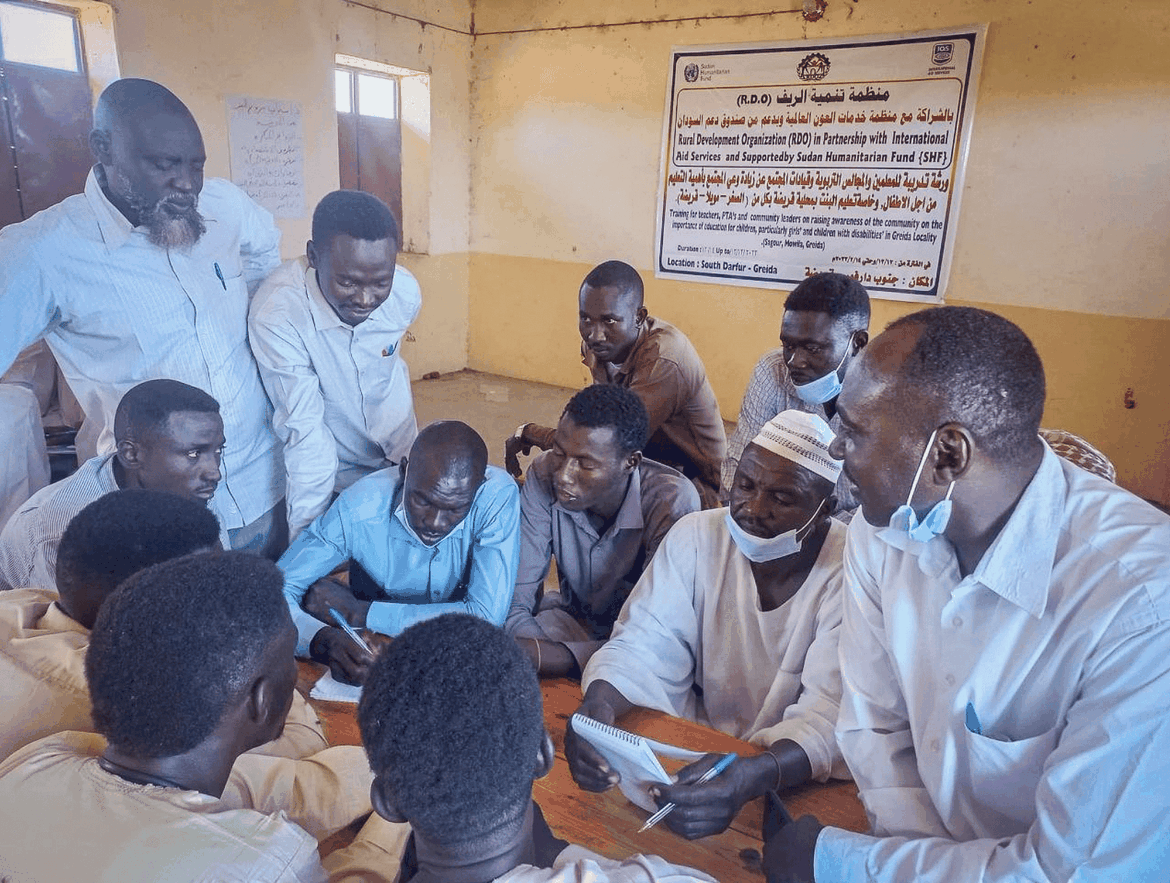Teachers attentively engage in a training session, Gereida, South Darfur.
17 January 2023, Gereida, South Darfur
In Gereida, a locality in South Darfur strained by years of conflict, Nouralhuda Primary School for Girls stands as a quiet symbol of hope. Among its teachers is Ahmed Salih, 34, who has spent years navigating the challenges of rural education in a region where violence and displacement have left deep scars.

- Ahmed Salih, teacher in Gereida
‘I haven’t had any training since I was assigned as a teacher,’ Ahmed says, reflecting on the harsh reality of being an educator in South Darfur. The lack of professional development and resources has not only hindered teachers but also affected the students—many of whom are displaced, traumatised, and struggling in overcrowded classrooms.
Recognising the urgent need for intervention, LM International, in coordination with the Norwegian Church Aid (NCA) and local partner Rural Development Organization (RDO), launched the project “Integrated life-saving and basic WASH, GBV, and Education services for vulnerable IDPs, Returnees, Refugees, and Host Communities affected by the crisis in Gereida, and Um Dafoug localities of South Darfur State, Sudan.” The SHF-funded initiative targeted vulnerable communities to provide holistic support, focusing on education, water and sanitation, and gender-based violence (GBV) prevention.

For the education component, 90 teachers and 30 parent-teacher association members in Gereida locality underwent comprehensive training. The workshops provided not only updated teaching methods but also addressed critical protection issues, such as recognising and preventing sexual exploitation and abuse (SEA) in schools and promoting the psychosocial wellbeing of students.
‘This training has improved our skills and will enhance the quality of education at our schools,’ Ahmed shares. He gestures to a stack of newly delivered supplies—textbooks, notebooks, and teaching resources. ‘We’ve received tools that will help us support our students better. I’m sure this will reflect in their academic performance.’
But the project goes beyond academics. In a region where protection risks are ever-present, especially for vulnerable children, the training equips teachers to address safeguarding issues and provide emotional support to students. ‘We’re now more aware of how to handle issues of abuse and support the mental health of every student,’ Ahmed adds.
Despite these advancements, Gereida’s schools still face enormous challenges. The area struggles with displacement, food insecurity, and limited infrastructure. Yet, the project’s comprehensive approach brings much-needed relief to communities under strain. The education programme, coupled with WASH and GBV interventions, is helping to stabilise these communities by addressing their most pressing needs.
‘This programme is more than just teacher training—it’s about restoring dignity and stability,’ says a representative from LM International. By integrating education with protection and WASH services, the project addresses the interconnected vulnerabilities of conflict-affected populations, ensuring that students and teachers alike have a safer and more supportive environment to thrive in.
For Ahmed, the impact is already visible. As he watches his students work intently on their lessons, he smiles with quiet pride. ‘This opportunity has been long overdue,’ he says. ‘But now, I feel like we’re finally giving these children a chance for a brighter future.’
________________
The initiative was part of the project titled "Integrated life-saving and basic WASH, GBV, and Education services for vulnerable IDPs, Returnees, Refugees, and Host Communities affected by the crisis in Gereida, and Um Dafoug localities of South Darfur State, Sudan," coordinated with the Norwegian Church Aid (NCA). The project, identified by code SUD-22/HSD20/SA1/WASH-E-P/INGO/21851, allocated its resources across sectors as follows: Water, Sanitation, and Hygiene (WASH) 50%, Education 29%, and Protection 21%.